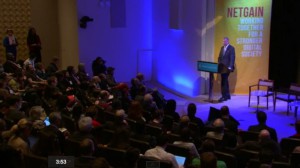FREE FLOW OF INFORMATION
an article by Lisa A. Hayes, Center for Democracy & Technology
Video: Launch of Netgain Challenge
This week, Nuala and I had the opportunity to take part in the launch of the NetGain Challenge, an exciting new initiative aimed at realizing the full potential of the Internet to “spark the next generation of innovation for social change and progress.

click on photo to enlarge
Launch of Netgain Challenge
Launched by the Knight, MacArthur, Mozilla, and Ford Foundations, the NetGain Challenge aims to unite all sectors to find genuine solutions to the challenges of our digital age. At the launch event, several innovative and proactive speakers started the conversation. Many talked about the immense amounts of data we now have and the potential it creates for both incredible good and serious privacy abuses; others spoke of the power of the Internet to facilitate free speech, to connect people, and to spread good ideas; and still others cautioned against censorship and the chilling effect of government surveillance.
The most motivating parts of the launch for me were the discussions around digital inclusion and empowerment, especially of women and minorities. The digital world we build depends on everyone being involved in shaping it – not just those with the most privilege or access to the newest technology.
The great news is that YOU can be a part of finding ways to shape this empowering digital world. The NetGain Challenge is about harnessing the power of the Internet to find solutions. It’s about engaging the global Internet community and generating fresh, new ideas that propel us forward. And with the philanthropic community rallying around these efforts, it is far more than just talk – it is action.
The Center for Democracy & Technology encourages everyone to take part in the NetGain Challenge. Share you voice. Share your ideas. Shape the digital society you want to live in.
Is Internet freedom a basic human right?
Here are additional remarks from the speech by Mary Robinson.
It has been inspiring to see how new communications technologies have allowed us to expand the space for public debate in recent years. The internet has enabled an explosion of information and expression worldwide, and while I am sceptical about claims that Twitter and Facebook ‘caused’ events like the Arab Awakening, it is evident that social media was an indispensable tool in the dissemination of uncensored information and the coordination of public protests in the region.
This raises questions concerning the role of companies and highlights a critical gap – many business leaders are taking major decisions on their own, often without a firm understanding of their impacts on human rights. To help mainstream respect for human rights in corporate decision-making, the European Commission has embarked on a project to develop guidance for three critical industry sectors, including information and communication technologies, which are so important in today’s world. My colleagues at the Institute for Human Rights and Business and Shift are working with the Commission to develop this guidance in order to give practical meaning to the UN Guiding Principles on Business and Human Rights, which were adopted in 2011.
As these tools become more accessible to people around the world – by 2020 there will be an estimated 5 billion people with access to the internet – civil society becomes better-equipped to engage in public life. Citizens have used mobile phones and internet platforms to record human rights abuses, pressure leaders to become more accountable, and connect and work together across borders. As one young Egyptian told us, “the only borders now are on maps.”
At the same time, our expectations are getting higher – and this is a good thing. When we are used to finding information freely available online, we expect to have the right to access that information without restriction. When we see various world leaders on Twitter, we expect to be able to contact our own leaders directly through such platforms. The more we grow accustomed to voicing our opinions online, the more we resist being silenced.
I believe this is part of a broader global trend towards greater participation. There is such a strong desire now to be consulted – really consulted, not just in a tokenistic way – and to be involved in government as opposed to just being objects of someone else’s policy decisions. We must embrace this trend; by supporting greater inclusivity and participation in governance, we will strengthen the development of democracy worldwide.